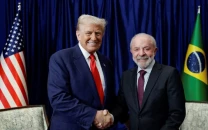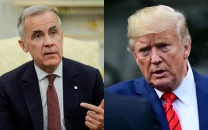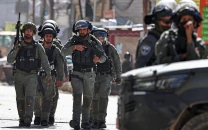Electioneering on Indian television
Voters have learnt to keep counsel, watch tamasha, attend rallies then vote exactly for who they feel will serve them.

The writer is a consulting editor with The Statesman and writes for several newspapers in India
This gives heated fodder to television channels that have already started carrying the results of polls as if these were somehow the reality. Intense debates are taking place every other night on pollsters’ views as political leaders cross swords and virtually declare war. Shrill spokespersons, chosen because of their shrillness, scream at all who cross their path on television, while anchors fuel the fires in what has already become a cacophony of unintelligent and completely speculative sound.
And since television has become the battleground, with the electorate still to find time from its daily struggle for livelihood, political leaders and ‘experts’ dash from channel to channel to air their views. No concession is made for the fact that the studio version of the truth might be far removed from the voters’ preferences in the final analysis.
The television debates that are structured to entertain and not inform, thus, focus on urban India and what the anchors feel should be (not necessarily are) the voters’ preoccupations. So, there is a great deal on corruption, with little more effort than badgering the players to ‘speak’ as of course, the nation wants to know. The focus remains on the BJP and the Congress, as the so-called ‘national’ television channels have decided long ago that they prefer a two-party system and the multitude of regional parties controlling the states be damned. In fact, these figure only in a ‘oh no’ kind of way, with the possibility of an alternative government at the centre being projected as a doomsday scenario and one to rally against.
The two favourite personalities for coverage, thus, are the BJP’s Narendra Modi and the Congress party’s Rahul Gandhi. It is made out as if the contest for power is between the two of them, with of course, Modi being extolled and Gandhi being pilloried. The fact that there are tall regional leaders, who could act as the brakes in the BJP’s rise to power, is not even acknowledged in serious conversation, with the entire issue of federalism having disappeared from television altogether. Instead, a black and white picture is being painted, with the shades of grey that really make up India’s plurality not figuring at all in the landscape being drawn by Indian television.
It is going to be a keenly contested election no doubt. This is because the rural Indian electorate (that determines the results) has kept its views to itself till date and all those screaming their guts out on television have no idea where they are placed today. This is not because the voters are indifferent but because they have learnt to keep their counsel, watch the tamasha, attend the rallies, speak to all and sundry, wear skull caps if pressured to and then vote exactly for whosoever they feel is best poised to serve their interests. Besides, the rural voter has too much at this point to focus on, and will look at the political parties and their candidates after the election commission announces the general elections. And as is the norm here, take a decision just before polling day, thereby further confounding the pollsters and the television anchors, who rely extensively on the drummed out statistics than on actual constituency reports.
The corporates that have sunk heavy money into the Indian media want a certain result. And have ensured through their money that the media peddles out this result even before the polls have taken place. They hope that the atmospherics created will then impact on the vote. But then, big industry has always been out of tune with the masses, particularly in developing economies, where the rural and poor masses far outweigh the few beneficiaries of fortune. And they have not realised that the wizened, old voter, sitting in some remote constituency, has developed the resilience to ignore the orchestra being played on television and insists on exercising his or her own carefully considered decision through the ballot that is the only voice he (or she) still has in decision-making. The choice thus might not be what television is tailoring for the nation but actually for the shades of grey that will upset the most careful of corporate and media calculations.
Published in The Express Tribune, October 19th, 2013.
Like Opinion & Editorial on Facebook, follow @ETOpEd on Twitter to receive all updates on all our daily pieces.


















COMMENTS
Comments are moderated and generally will be posted if they are on-topic and not abusive.
For more information, please see our Comments FAQ